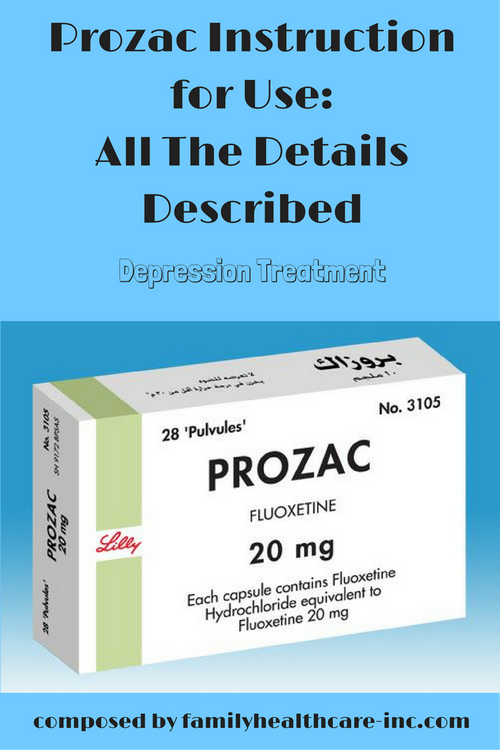What is Prozac?
Prozac, the trade name of one of the small group of antidepressants known as selective reuptake inhibitors of serotonin, which increases serotonin level in the brain. Serotonin, or 5-hydroxytryptamine, is a neurotransmitter involved in a number of functions. Low serotonin levels are observed in case of depression. It is believed that Prozac restores self-confidence, improves self-image and increases energy. This drug is more effective than the old antidepressants, and less toxic, but can cause less number of side effects.
Indications for Use
Prozac from Canadian Pharmacy is released in the form of hard gelatin capsules, each containing 20 mg of fluoxetine hydrochloride. This drug is actively utilized to treat patients suffering from various types of:
- depression;
- obsessive-compulsive states;
- bulimic neurosis (to reduce appetite for body weight decrease).
- An additional indication for Prozac use is alcoholism.

Mechanism of Action
The preparation Prozac contains active substance Fluoxetine providing an effect of the antidepressant. Fluoxetine selectively inhibits serotonin reuptake, thereby making contribution to this hormone level increase in the brain, which provides a long-lasting effect. Prozac has a pronounced antidepressant effect reducing feelings of anxiety and fear and helping improve mood. This drug does not have toxic effects on the myocardium and does not become a cause of sedation. In addition, Prozac use does not lead to the orthostatic hypotension development.
Application and Dosage Recommendations
In the course of Prozac’s treatment, the dosage regimen should be prescribed based on clinical symptoms and mental disorders severity.
In accordance with the official instruction for use, Prozac application method is as follows:
- obsessive-compulsive disorder: the optimal dose varies between 20-60 mg/day;
- depression: the maximum initial Prozac dose – 20 mg/day;
- premenstrual dysphoric disorders: the optimal maintenance dosage is 20 mg/day;
- disorder of food intake (bulimia nervosa): Prozac available at Canadian Health&Care Mall is prescribed in a dosage of not more than 60 mg/day.
The above optimal doses can be increased or vice versa, reduced, but the maximum daily dose should not be over 80 mg, higher values effects were not studied.
Meals intake does not have a significant effect on fluoxetine absorption, it can be taken regardless of food intake.
It is not recommended to suddenly withdraw antidepressant drugs, as this is fraught with a withdrawal syndrome.
For patients with severe impairment of kidney and liver, as well as accompanying pathologies, or taking other medications, Prozac dosage should be selected according to individual parameters.
Overdose
In the case of taking this drug in doses that are significantly higher than recommended, an overdose may occur. Prozac overdose symptoms are usually:
- drowsiness;
- vomiting;
- convulsions;
- tachycardia.
Also, during Prozac overdose, cardiogram changes are possible (prolongation of the Q-T interval), there also observed the onset of:
- ventricular tachycardia;
- fainting;
- stupefaction;
- cardiac arrest;
- coma.
In rare cases, deaths were registered in Prozac overdose, however, 378 patients (out of 633 who reported overdose) recovered completely. In some cases, violations caused by an overdose were irreversible.
A specific antidote to this drug today does not exist. Symptomatic treatment is recommended. Forced diuresis and hemodialysis, in this case, are not effective. In case of an overdose, immediately consult a doctor.
Prozac Withdrawal Symptoms
 Prozac, as well as other representatives of the SSRI group, has a marked withdrawal syndrome (most often paroxetine), usually, this state persists for 1-7 days.
Prozac, as well as other representatives of the SSRI group, has a marked withdrawal syndrome (most often paroxetine), usually, this state persists for 1-7 days.
It is necessary to avoid the abrupt withdrawal of the medication, the decision to discontinue treatment is taken by the attending physician by gradually reducing Prozac dosage.
The most common symptoms of withdrawal include the following phenomena:
- insomnia;
- dizziness;
- instability of gait;
- tremor;
- paresthesia;
- visual impairment;
- sense of anxiety;
- dyspepsia, sometimes diarrhea.
In those cases when unwanted clinical symptoms appear during the withdrawal of treatment, it is necessary to contact the treating specialist, he will select the appropriate treatment.
Side Effects
Since Prozac is a specific serotonin re-uptake inhibitor, undesirable side effects, appropriate for all drugs in this group, may occur during its use.
| Body System | Side Effects |
| cardiovascular system | form of vasodilation, leveling down blood pressure, atrial flutter and vasculitis |
| digestive system | xerostomia, nausea, vomiting, diarrhea, weight loss and appetite loss, taste sensations loss, dysphagia and esophagus pain |
| nervous system | increased general fatigue, paresthesia, frequent headache, unreasonable anxiety attacks, sleeplessness, decreased libido, nightmares |
In addition, during treatment with Prozac, vision and mydriasis, malfunctioning of the genitourinary system (increased urination, sexual dysfunction, ejaculation disorder) are possible.
Less common side effects are in the form of:
- ataxia;
- influenza-like state;
- psychomotor hyperactivity;
- vaginal bleeding.
It is possible that the patient may develop an allergic reaction to Prozac components in the form of skin manifestations (hives, erythema, skin itch, ecchymosis), photosensitivity, alopecia, Quincke’s disease or anaphylactic shock.
Contraindications
Prozac use is contraindicated in patients with intolerance or hypersensitivity to the active substance – fluoxetine. In addition, the patient’s epilepsy, pronounced impairment of renal function, benign prostatic hyperplasia, glaucoma, atony of the bladder and convulsive syndrome is also a contraindication to Prozac use.
Drug Interactions
- When used simultaneously with drugs that cause a depressing effect on the central nervous system, it is possible to significantly increase the inhibitory effect on the central nervous system with ethanol, as well as increase seizures likelihood.
- In case of a simultaneous application with MAO inhibitors (furazolidone, procarbazine, tryptophan), the development of serotonin syndrome (confusion, hypomanic state, motor anxiety, agitation, convulsions, dysarthria, hypertensive crisis, tremor, nausea, vomiting, diarrhea) is possible.
- In case of simultaneous use of fluoxetine inhibits the metabolism of tricyclic and tetracyclic antidepressants, trazodone, carbamazepine, diazepam, metoprolol, terfenadine, phenytoin, which leads to an increase in their concentration in serum, enhancing their therapeutic and side effects.
- In case of simultaneous use, it is possible to suppress the biotransformation of drugs metabolized with CYP2D6 isoenzyme participation.
- When used together with hypoglycemic agents, it is possible to intensify their action.
- There have been reports of increased warfarin effects when used concomitantly with fluoxetine.
- In case of simultaneous use with haloperidol, fluphenazine, maprotiline, metoclopramide, perphenazine, pimozide, risperidone, sulpiride, trifluoperazine, cases of development of extrapyramidal symptoms and dystonia are described; with dextromethorphan – the case of hallucinations development is described; with digoxin – a case of increasing the concentration of digoxin in the blood plasma.
- In case of simultaneous use with lithium salts, it is possible to increase or decrease the concentration of lithium in blood plasma.
- In case of simultaneous use with imipramine or desipramine, it is possible to increase imipramine or desipramine concentration in blood plasma 2-10 times (may last for 3 weeks after fluoxetine excretion).
- In case of simultaneous use with propofol, a case is described in which spontaneous movements were observed; with phenylpropanolamine – a case in which dizziness, weight loss, hyperactivity was observed.
Pregnancy and Lactation Period
In the course of experimental studies, data on the negative fluoxetine effect on the fetal development and the course of pregnancy are unrecorded, but Prozac treatment during pregnancy is not recommended. The medicine can be prescribed by the treating specialist only in those cases if the expected effect for the mother is higher than the negative consequences for the fetus.
Special Instructions
It is recommended to apply Prozac with special care to patients with impaired liver and kidney function, epileptic seizures in anamnesis, cardiovascular diseases.
Patients suffering from diabetes may observe blood glucose levels change, which requires the hypoglycemic drugs dosage regimen correction. When fluoxetine is used by weakened patients, the likelihood of epileptic seizures magnifies.
With the simultaneous use of fluoxetine and electroconvulsive therapy drugs, prolonged epileptic seizures are possible to appear.
Fluoxetine can be used no earlier than 14 days after the withdrawal of MAO inhibitors. The period after the withdrawal of fluoxetine before initiating therapy with MAO inhibitors should be at least 5 weeks.
- Older patients need a correction of the dosing regimen.
- The safety of fluoxetine in children is not recorded.
- During the treatment period, do not drink alcoholic beverages.
Prozac and Alcohol
Is it possible to apply Prozac with alcohol? When taking Prozac in the central nervous system, the process of a serotonin blockade takes place. It greatly influences the balance. Prozac after alcohol does not make any contribution to the increased alcohol concentration level in the blood and to increase its effect, but Prozac is strictly banned for an application.
If you combine Prozac and alcohol, the consequences lead to excessive nervous overexertion, which brings damage to the nervous system. Some neurons are excited under the drug action, others under the influence of alcohol, resulting in a time when there can be an unpredictable collapse reaction leading to a blood stroke. Even the cultural attitude to alcohol neutralizes taken Prozac, the effectiveness of which disappears instantly. In this case, the mental state remains depressed and the possibility of serious complications is increased considerably.
Prozac’s compatibility with alcohol is strictly prohibited. Many antidepressants behave too aggressively towards the liver. Since they contribute to oxidative and enzymatic processes, as well as alcohol, in interaction with which the powerful force of this influence is greatly enhanced.
The drug itself is processed much faster, but the required dose of antidepressant at this time is difficult to pick up. The interaction of Prozac with alcohol causes acute aggravation of depressive disorder and immediate disruption of treatment at any stage of its course.

